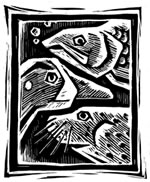- Home
- Restoration Projects
- Project Search
- NOAA Harbor Protection Program – Cordova Clean Harbor 14120112-A
Project Information
Title: NOAA Harbor Protection Program – Cordova Clean Harbor 14120112-A
Project Year and Number: 2014: 14120112-A
Other Fiscal Years and Numbers for this Project: 2016: 16120112-A, 2015: 15120112-A, 2013: 13120112-A
Principal Investigator (PI): John Whissel
Managing Agency: NOAA
Assisting Personnel: None
Research Location: Cordova
Restoration Category: General Restoration
Injured Resources Addressed: Mussels
Abstract:Like many public harbors, the Cordova Harbor is faced with chronic oil and debris pollution. Annually waters in and around the harbor are coated with spilled petroleum products, mostly the result of contaminated bilge water, and debris from boat maintenance projects. The constant presence of oil within the harbor has led to it being used as a positive control for hydrocarbon studies in Prince William Sound (Thomas et al. 2007). Additionally, litter management in the harbor is a constant challenge for city staff. Cordova’s harbor is located in the heart of town, and is heavily relied upon by the commercial fisherman, recreationists, tourists, and subsistence users for work, food, and recreation. Locals and tourists alike take walks on the Breakwater Trail or the dock floats, and they enjoy sitting at the Fisherman’s Memorial park bench overlooking the harbor. People are often seen fishing from the dock floats, and sea otters, seals, sea lions, and shorebirds frequent the harbor for foraging and shelter. The amount of debris and hazardous waste in the Cordova Harbor is not only a health risk, but also an eyesore. By improving the water quality and appearance of the Cordova Harbor, the human services injured resource will be enhanced. Each year, from May through September, the harbor’s 700 slips are fully occupied, and additional transient moorage is heavily utilized. With a broad range of vessels operations using the harbor including commercial fishing boats, tenders, charter, pleasure, sail, houseboats (liveaboards), and subsistence skiffs, a portfolio of approaches is required to improve water quality including an increased and consistent public education and awareness of clean harbor practices and resources
Proposal: View (165 KB)
Reports:
Annual Report FY14: View (51 KB)
Final Report: See Project 16120112-A
Publications from this Project: None Available
